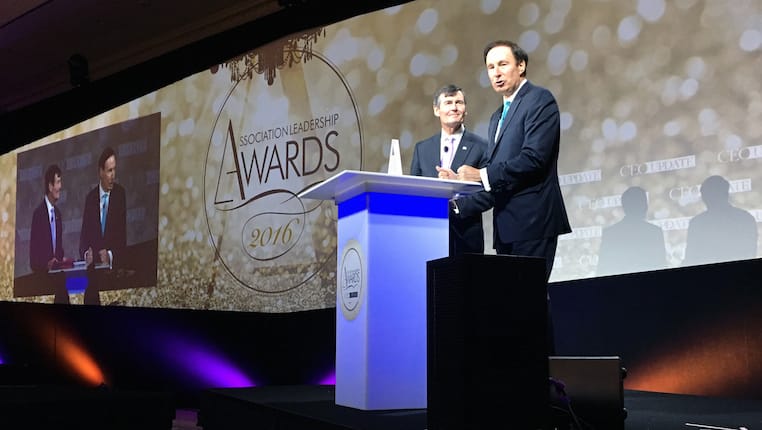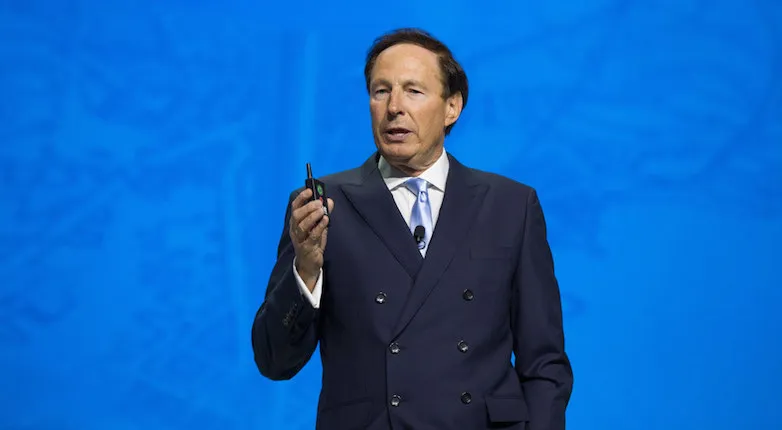
NACDS’ Steve Anderson accepts Trade Association CEO of the Year award.
Steve Anderson joined a select group of business leaders last month when he was recognized as trade association CEO of the year.
As only the third winner of the honor, part of the Association Leadership Awards sponsored by CEO Update, the National Association of Chain Drug Stores president and chief executive officer earned a distinction he shares with Tom Donohue of the U.S. Chamber of Commerce, the nation’s largest business organization, and Tom Kuhn of the Edison Electric Institute, a group that represents investor-owned electric utilities.
Anderson and this year’s two other leadership award winners — Christine McEntee of the American Geophysical Union and Aric Newhouse of the National Association of Manufacturers — were honored during a luncheon at the new Trump International hotel in Washington, D.C., attended by 450 of their colleagues. The winners were chosen by an independent 13-member panel chaired by Art Herold, a partner in the law firm of Webster, Chamberlain & Bean.

In recognizing Anderson’s achievements, the judges affirmed what people in the retail pharmacy industry have known for quite some time — NACDS is headed by a smart, decisive, disciplined leader who thoroughly understands the complex issues that confront the association’s members, and has developed a forward-looking strategy for dealing with them.
When Anderson joined NACDS almost 10 years ago (after running the National Restaurant Association and the American Frozen Food Institute), the organization had lost some of its edge and faced financial uncertainty. He moved quickly to streamline operations and craft a plan that succeeded in putting NACDS’ fiscal house in order.
More important, Anderson recognized that NACDS couldn’t be all things to all people. He identified three pivotal areas — member services, government relations and communications — where the association needed to stand out in order to make the greatest contribution in support of the companies it represents. Throughout his tenure, Anderson has demonstrated a sure hand in adapting to changes in business, public policy and politics — the three spheres which, as he says, form the nexus of association work — while adhering to the guiding principles that have served the association well.
The results speak for themselves. With the guidance of the NACDS board and the support of a talented, engaged staff, Anderson has galvanized the organization and the industry. His strong commitment to responding to the needs of all members — associates in the supplier community as well as retailers — is reflected in the work of the NACDS Retail Advisory Board, which includes executives from companies as varied as Nielsen, Time Inc. Retail, Mondelez International, Lornamead and Crossmark, and the successful restructuring of the association’s lineup of events.
Four years ago NACDS combined three conferences — one dedicated to front-end merchandise, another to pharmacy and technology, and a third to distribution and logistics — to create Total Store Expo. The objective was to break down artificial barriers and encourage the development of synergies between different parts of the store. As this year’s installment of the event in Boston demonstrated, TSE is now an effective catalyst for interaction among business partners throughout chain pharmacy.
Perhaps Anderson’s greatest achievement is raising NACDS’ profile and that of community pharmacy. Not all that many years ago, legislators and policy makers often overlooked the importance of pharmacy when debating health care policy. The pro-patient, pro-pharmacy message that NACDS has built around the work of its members — most of which have made great strides in recent years in turning their stores into neighborhood health care centers — together with the assistance the industry provided with the rollout of Medicare Part D and the Affordable Care Act, has made people sit up and take notice.
The association and its members now enjoy broad bipartisan support, and they are regularly included in discussions about expanding access to health care, improving patient outcomes and controlling costs.
With a deep knowledge of history and extensive experience in the halls of power in Washington, Anderson understands what it takes to get things done. Above and beyond that, he grasps the value that community pharmacy already brings to the nation’s health care system and the potential it has to play an even bigger role going forward.
The industry and the association that represents it are fortunate to have a champion with that combination of skills as it looks to the future.







